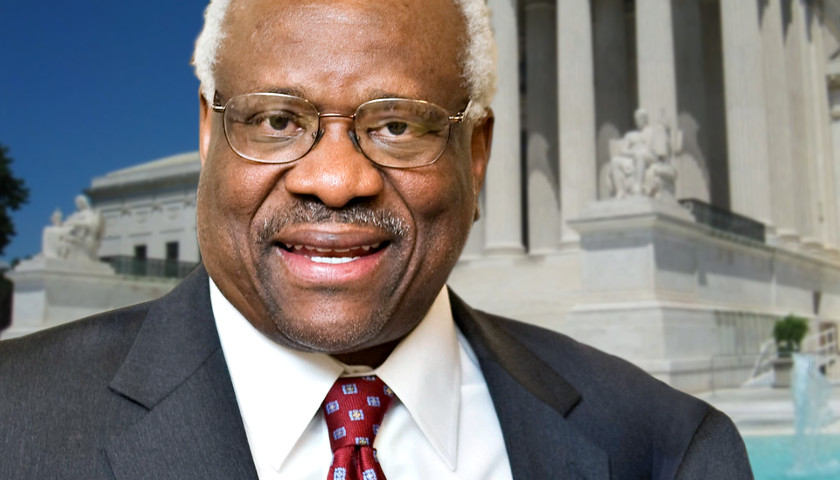by Ken Masugi
If it’s true that “natural right is dynamite,” as political philosopher Leo Strauss wrote, then Justice Clarence Thomas just went nuclear on the abortion debate.
While Thomas’s concurring opinion in Box v. Planned Parenthood has received considerable commentary, his deepening of the judicial and, hence, the political debate over abortion demands further elaboration. His reply to the leading threat to the principles of the Declaration of Independence is his latest attempt in a career of restoring its authority.
Thomas had argued, “this [Indiana] law and other laws like it promote a State’s compelling interest in preventing abortion from becoming a tool of modern-day eugenics.” The Indiana law had barred abortion for the purposes of sex and race selection, and for fetal disabilities.
Thomas critics contend he wrongly introduced elements of the now-(justly) maligned eugenics movement into the abortion debate. But recall that Justice Blackmun in Roe v. Wade observed (as Professor David Bernstein reminded me), “population growth, pollution, poverty, and racial overtones tend to complicate and not to simplify the problem.”
I would argue instead that Blackmun was trying to obfuscate the issue, whose terrible clarity Thomas was trying to highlight: “From the beginning, birth control and abortion were promoted as means of effectuating eugenics.” Thomas’s approach even cites G. K. Chesterton’s essay on eugenics, in which the English critic harrumphed, “Most Eugenists are Euphemists.”
In his 20-page opinion, Thomas cites two contemporary advocates of contraception and eugenics:
[Dr. Alan Guttmacher] added that the question whether to allow abortion must be “separated from emotional, moral and religious concepts” and “must have as its focus normal, healthy infants born into homes peopled with parents who have healthy bodies and minds.” . . . Similarly, legal scholar Glanville Williams wrote that he was open to the possibility of eugenic infanticide, at least in some situations, explaining that “an eugenic killing by a mother, exactly paralleled by the bitch that kills her misshapen puppies, cannot confidently be pronounced immoral.” . . . The Court cited Williams’ book for a different proposition in Roe v. Wade(citations omitted).
The ugly nakedness of the eugenics dogma, with its attendant euphemisms, stands exposed in Thomas’s explanation of Roe. No longer can credible critics of the court turn away from the monstrosity and focus on federalism and substantive due process clause interpretation issues.
The new, politicized abortion goes to the core of American political principles and the abiding integrity of the Declaration of Independence. The abortion debate has long since morphed from “safe, legal, and rare” into something much more disturbing. In this, critics of Roe rightly align themselves with critics of the pro-slavery case of Dred Scott (1857), as the most thoughtful pro-life voices have done for decades. They deny that the destruction of future generations should be given no more moral significance than “the bitch that kills her misshapen puppies.”
Here’s how deeply the Thomas charge cuts: The eugenics movement, which had emphasized artificial contraception as a means of population control, was part of the Progressive movement dedicated to replacing the American Founding with the willful assertions of History. In attacking the Declaration of Independence, preeminent Progressive Woodrow Wilson mocked the document and insisted, “Living political constitutions must be Darwinian in structure and in practice. Society is a living organism and must obey the laws of life, not of mechanics; it must develop.” To be more precise, we in charge politically must develop it. A successor of Wilson would later declare: “We are the change.” That is, we, meaning “we women,” direct evolution.
This will to mastery of nature empowers to varying degrees all three waves of feminism – roughly, legal equality of the sexes, gender equality, and a feminism of superiority. New York Times columnist Ross Douthat compared abortion policy in feminism’s last two stages:
The legalization of abortion in America happened in the transition from this second dispensation to the third, contemporary one, in which feminist arguments predominate and reproductive policy is understood primarily in terms of female liberty and general sexual emancipation. Which is why, in those 1970s debates over abortion, you can see both arguments at work — with what [Supreme Court Justice] Ruth Bader Ginsburg once described [in an interview] as a desire to subsidize abortions for “populations that we don’t want to have too many of” coexisting with her own rights-of-woman arguments.
The third wave of feminism is in fact a new form of the old enemy of American liberty, aristocracy, government by an elite. The older forms of feminism (for women’s suffrage) and what Douthat calls “female liberty and general sexual emancipation” set the conditions for a feminism of superiority – aristocratic feminism.
The third wave of feminism dispenses with equality and now promotes its own version of freedom. The existence of future generations depends on a woman’s choice and her doctor – personal will and science. This tyranny over nature and time, which has always been contemplated as a possibility, goes back to the 5th century B.C. in Aristophanes’ Assembly of Women. Mary Shelley’s Frankenstein or the Modern Prometheus adds science to these speculations about the malleability of human nature.
We know well the rest of the story, thanks to the scholarship of Scott Yenor, first among others. Yenor discerns the unending drama of this latest feminism: “It is difficult to imagine how the work of undoing gender could be completed: It seems to demand continual social transformation not only in the name of liberation from past impositions, but also as a way to secure recognition for tomorrow’s desires.”
Older forms of feminism had to respect natural sexual differences, but the newer version brushes aside sex as merely socially constructed “gender.” The right of abortion is a defining necessity for this new form of eugenics. Without abortion rights, the female gender lacks ultimate power over the fate of humanity. The very name of “eugenics” presupposed a common genos or species. A gyngenics or female species would destroy the human race.
Against this horror, the unalienable rights of pursuing happiness and preserving safety of the Declaration of Independence remain our anchor, as it has been against earlier forms of tyranny.
– – –
Ken Masugi, Ph.D., is a senior fellow of the Claremont Institute. He has been a speechwriter for two cabinet members, as well as for Clarence Thomas when he was chairman of the Equal Employment Opportunity Commission.




